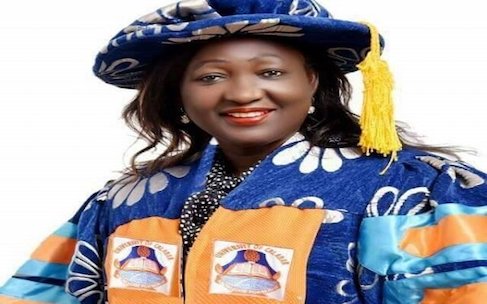Education
University of Calabar’s Unending Controversies

By Jerome-Mario Utomi
It is no longer news that the management of the University of Calabar has suspended the Dean of the Faculty of Law, Prof Cyril Ndifon, over allegations of sexual harassment of female students.
Ndifon’s suspension which took immediate effect followed a probe into the allegations of sexual harassment leveled against him by some female students of the faculty who were recently seen in a viral video storming the office of the school’s Vice-Chancellor, Prof Florence Obi, wielding placards with inscriptions such as, “Ndifon must go for our sanity,” “We are tired of buying law journals,” “We are tired of lecturers not attending classes,” and “Law girls are not your bonanza’.
The suspension was reportedly conveyed via a letter by the school’s Registrar, Gabriel Egbe, and partly read, “Please refer to our letter Ref UC/REG/DISC.45A dated August 14, 2023, on your alleged violation of the provisions of the extant laws and policies of the university and your response to the said letter which was dated August 16, 2023. “The vice-chancellor has gone through your written representations and is not satisfied with your explanations.
Essentially, while the suspension is appreciated, this piece on the other hand believes that Unical is not alien to scandals. Profession Ndifon’s latest sex scandal is just an addition to the institution’s gale of bad press.
Recall that the erudite Professor of Law was in 2015 suspended over the same sexual harassment allegation. Commentators are never tired of harping on the university’s lurid downside which has seemingly defied successive leaderships.
For example, reports have shown that Unical is not only reputed for poor relationships with students but equally allergic to good image when it comes to dealings with its publics, including suppliers.
Notedly, while the dust raised by the Ndifongate (part two) appears to be settling, another tar on Unical’s linen has just reared its ugly head, prompting analysts to suggest that there is something deeply troubling with the school, albeit hidden.
In this light, the reported ordeal suffered in the hands of the successive University of Calabar leadership, from 2014 till date, (9 years), by Isioma Aninyem, a Nigerian, trading under the name Michael Hull Services, an educational services company that is primarily involved in sourcing and supplying of educational materials, particularly journals, to educational institutions, readily comes to mind.
Giving details of what he termed ‘’using trickery and deception to obtain sets of academic/research journals to the tune of N1, 034,700 (One Million and Thirty-four Thousand, Seven Hundred Naira Only) from the organization in 2014’’, the management of MICHAEL HULL SERVICES in the referenced report explained that the then university librarian, Dr. (Mrs.) Ruth Simon Bassey contacted Michael Hull Services, in the aforementioned year – to provide academic/professional journals to the university library in preparation for the accreditation of the academic programs of the university by the National University Commission.
Dr. (Mrs) Bassey, according to the firm, had assured that immediate payment would be made after the delivery of the journals to the university.
She thus pleaded with him (Isioma Anyinyem) to grant the credit to the university even though this was against the practice in the firm. The organization agreed and supplied the journals to the university library.
Unfortunately however, to this day, the organization has written and appealed to the bursar, vice-chancellor, accountant and the university librarian to pay the money as promised, but the appeals never yielded any result.
‘In 2015, I demanded payment. She informed me that the invoice was being processed. In 2016, I called again that I had not been paid; she stated that the university and the former university bursar were having legal issues in court and that I would be paid after the case. She later called me to say that a new university bursar had been appointed and that I would be paid.
“But contrary to that promise, when I called the new university bursar, she stated that she was unaware of the non-settlement of that invoice. I sent the details to her but nothing was done.
“As if that was not enough woes, ‘in 2018, the university bursar sent a message to my telephone stating that the contract was awarded by the former university vice-chancellor and funded or paid for. I quickly informed Dr. (Mrs.) Simon Bassey of the new development but she immediately denied the bursar’s claim and told me she had met her on several occasions to advance my case.
“She went further to inform me that it would be false, and sent this Payment Voucher Number: Michael Hull, PV, 158 of 14th Jan, 016 # 906,865.50. This was likely to reassure me that there was no payment made to anybody. I forwarded the message to the bursar, but she refused to state who the payment was made to. I wrote to the vice-chancellor of the university, demanding and appealing to him to pay me. There was no response from him’’.
Continuing, Mr Isioma said “In 2019, the university librarian, Mrs. Nkoyo Edem called me to apologize on behalf of the university and appealed to me not to take legal action against the university, and that I should forward a copy of the original invoice of the supplied journals to her for onward processing. This I did, but unfortunately, the university has refused to pay me or even reach out to me till today.
“Not even my petition to the Independent Corrupt Practices and Other Related Offices Commission (ICPC) and The Public Complaint Commission, have been able to compel UNICAL management to positively respond to my demand. Isioma concluded”
This is the reality confronting Isioma Aninyem and his firm, Michael Hull services!
Going by the above account, it will elicit the question as to; who knows how many Nigerians have suffered similar fates in the past or still going through such plight in the hands of the University of Calabar management. How many Nigerian businessmen/women would stand the test? Who will stop the university authority from such inhuman treatment of their fellow Nigerians? What is the offense committed by Michael Hull? Who should be the judge? Must we as a nation allow UNICAL to go on with such practice to the detriment of businesses in Nigeria?
Undoubtedly, it will be convenient for some commentators to argue that this is a commercial dispute and therefore, should be settled privately without coming to the public domain. But in the opinion of this piece, there are glaring reasons why this particular issue must be investigated.
Very fundamental, the university in question is a public institution of higher learning conducted with the approval, and from the funds of the public. Therefore, when such a public institution ceases to have public support or is involved in any form of infraction that has to do with a lack of transparency or accountability, or a combination of both, it forfeits its right to exist. In the present circumstance, a university maintained on permanent public funds has been accused of being serially reputed for undermining public trust and therefore, this piece sees no reason why it should not be placed under scrutiny.
Regardless of what others may say about the amount of money in question, by all standards, N1N1,034,700One Million and Thirty-four Thousand, Seven Hundred Naira Only), is a huge amount that must not be allowed go to unaccounted for. Similarly, assuming without conceding that the money used for the supply of the journal was a loan sourced om a financial institution, the weight of accumulated interest in the past 9years would have been crushing by now.
Like an unchained torrent of water submerging the whole countryside and devastating crops, even so, will the authorities of the university continue to treat their suppliers and other stakeholders if this particular infraction and others are not investigated and those involved bare ought to book?
President Bola Ahmed Tinubu led the Federal Government and other relevant stakeholders must, therefore, look into this present issue as there exists the possibility of such ill-treatment escalating in other universities in Nigeria if the present is handled with levity.
Jerome-Mario Utomi is the Programme Coordinator (Media and Public Policy), at Social and Economic Justice Advocacy (SEJA), Lagos. He could be reached via jeromeutomi@yahoo.com/08032725374.
Education
FG unveils interest-free loan for tertiary institution workers

By Tony Obiechina Abuja
The Federal Government has unveiled the Tertiary Institutions Staff Support Fund (TISSF), an interest-free loan scheme designed to improve the welfare, professional growth, and financial stability of Nigeria’s tertiary institution workforce.
The Minister of Education, Dr.
Tunji Alausa, who unveiled the initiative in Abuja on Thursday, described it as a strategic empowerment platform that would give both academic and non-academic staff the financial support they needed to serve students with renewed dedication and live with dignity.The minister further explained that TISSF is an integral part of President Bola Tinubu’s Renewed Hope Reform Agenda for the education sector, which prioritises people as the nation’s greatest asset in transforming the education sector and driving economic growth.
According to him, the programme is a joint initiative of the Federal Ministry of Education and the Tertiary Education Trust Fund (TETFund), implemented in partnership with the Bank of Industry (BoI).
Under the scheme, beneficiaries can access interest-free loans for medical expenses, family and accommodation needs, transportation (including electric vehicles and CNG conversions), small-scale enterprises and agriculture, as well as academic advancement through certifications and capacity-building programmes.
The Minister said; “TISSF is more than a financial product; it is a workforce transformation tool. By easing financial burdens, we expect to improve staff retention, boost morale, and enhance institutional performance for better student outcomes.”
Eligibility, he said, covers confirmed full-time staff of all federal universities, polytechnics, and colleges of education, along with one state-owned institution in each category per state, while applicants must have at least five years to retirement and be members of recognised staff unions such as ASUU, NASU, COEASU, and SSANIP. This translates to 248 eligible institutions nationwide.
“Each eligible staff member can access up to N10 million, subject to a cap of 33.3% of their gross annual salary. The loans are interest-free, repayable over five (5) years, with 12 months moratorium before repayment begins,” the Minister added.
Education
FG reaffirms zero tolerance for exam malpractice

By Tony Obiechina Abuja
The Minister of Education, Dr. Olatunji Alausa has reaffirmed the Federal Government’s commitment to transparency, accountability, educational excellence, and zero tolerance for examination malpractice.
In a statement by Mrs Folashade Boriowo Director of Press and public relations, Alausa spoke against the backdrop of the 2025 WAEC results released recently.
According to official statistics from WAEC, the percentage of candidates who obtained five credits with or without English Language and Mathematics rose to 91.
14% in 2025, compared to 73.79% in 2024 and 84.38% in 2023.However, candidates securing five credits including English Language and Mathematics stood at 62.
96% in 2025, down from 72.12% in 2024 and 79.81% in 2023.Reiterating the Federal Government’s zero-tolerance policy towards examination malpractice, Dr. Alausa highlighted the consistent decline in malpractice rates over the past three years—from 16.29% in 2023 to 11.92% in 2024, and 9.70% in 2025.
He attributed this progress to robust anti-malpractice measures introduced by WAEC, including the serialization of question papers in key subjects such as English Language, Mathematics, Biology, and Economics.
The Minister emphasized the government’s resolve to build human capacity through continuous teacher training and support.
“We are committed to producing smart, competent teachers to better prepare our students for academic success. This is crucial to ensuring that our examinations remain credible and flawless,” he said.
According to him, going forward, the Ministry will roll out Computer-Based Testing (CBT) for WAEC and NECO objective papers in 2025, and for both essay and objective papers in 2026. This step is aimed at enhancing efficiency, curbing malpractice, and aligning Nigeria’s examination system with global best practices.
Dr. Alausa called on all stakeholders, including parents, guardians, teachers, and community leaders, to support students, encourage discipline, and create enabling environments for learning.
“Let us work together to ensure that every hardworking child has the opportunity to succeed,” he urged.
Education
Varsity Don Advocates Establishment of National Bureau for Ethnic Relations, Inter-Group Unity

By David Torough, Abuja
A university scholar, Prof. Uji Wilfred of the Department of History and International Studies, Federal University of Lafia, has called on the Federal Government to establish a National Bureau for Ethnic Relations to strengthen inter-group unity and address the deep-seated ethnic tensions in Nigeria, particularly in the North Central region.
Prof.
Wilfred, in a paper drawing from years of research, argued that the six states of the North Central—Kwara, Niger, Kogi, Benue, Plateau, and Nasarawa share long-standing historical, cultural, and economic ties that have been eroded by arbitrary state boundaries and ethnic politics.According to him, pre-colonial North Central Nigeria was home to a rich mix of ethnic groups—including Nupe, Gwari, Gbagi, Eggon, Igala, Idoma, Jukun, Alago, Tiv, Birom, Tarok, Angas, among others, who coexisted through indigenous peace mechanisms.
These communities, he noted, were amalgamated by British colonial authorities under the Northern Region, first headquartered in Lokoja before being moved to Kaduna.
He stressed that state creation, which was intended to promote minority inclusion, has in some cases fueled exclusionary politics and ethnic tensions. “It is historically misleading,” Wilfred stated, “to regard certain ethnic nationalities as mere tenant settlers in states where they have deep indigenous roots.”
The don warned that such narratives have been exploited by political elites for land grabbing, ethnic cleansing, and violent conflicts, undermining security in the sub-region.
He likened Nigeria’s ethnic question to America’s historic “race question” and urged the adoption of structures similar to the Freedmen’s Bureau, which addressed racial inequality in post-emancipation America through affirmative action and equitable representation.
Wilfred acknowledged the recent creation of the North Central Development Commission by President Bola Tinubu as a step in the right direction, but said its mandate may not be sufficient to address ethnic relations.
He urged the federal government to either expand the commission’s role or create a dedicated Bureau for Ethnic Relations in all six geo-political zones to foster reconciliation, equality, and sustainable development.
Quoting African-American scholar W.E.B. Du Bois, Prof. Wilfred concluded that the challenge of Nigeria in the 21st century is fundamentally one of ethnic relations, which must be addressed with deliberate policies for unity and integration.


















